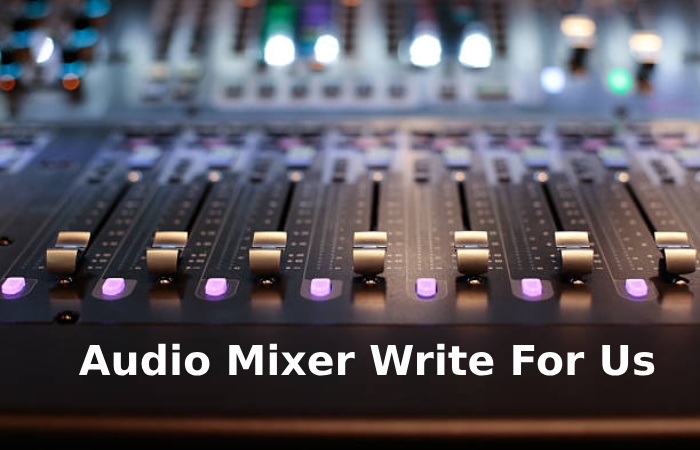 Audio Mixer Write For Us
Audio Mixer Write For Us
An audio mixer, known as a mixing console or mixing board, is a device used to combine and control audio signals from various sources. It’s a crucial tool in audio production for live events, recording studios, or broadcasting setups. The primary use of an audio mixer is to adjust the levels, equalization, and other audio parameters to achieve a balanced and polished sound.
Information Tech Web was founded in 2022. Informationtechweb has come a long way since its beginning in the United States. At a time when doubt is at its peak and information flows more and more complex, informationtechweb.com is dedicated today, even more than yesterday, to understanding the great news and innovations in the categories: Automotive, Technology, Culture, Business, Marketing, Gadgets, Sports, Beauty, Games and more. You can mail us at contact@informationtechweb.com
About Audio Mixer
Audio mixers have multiple input channels that allow you to connect microphones, instruments, playback devices, and other audio sources. Each channel typically has controls for adjusting volume, tone (via equalization), and sometimes effects like reverb or compression.
Features of Audio Mixer
The mixer also includes a master output section for adjusting the overall output level and routing the mixed signal to various destinations, such as speakers, recording devices, or broadcasting equipment. Audio mixers have multiple features designed to facilitate precise control and manipulation of audio signals.
Common Features Contains
- Channels and Inputs: Mixers offer multiple input channels for connecting microphones, instruments, and audio sources. Each channel has volume, pan, and often EQ controls.
- Equalization (EQ): EQ knobs adjust the frequencies of each channel to enhance or attenuate specific audio bands, shaping the overall tonal quality.
- Auxiliary Sends: Aux sends allow you to route a portion of a channel’s signal to external effects processors, creating reverb, delay, or other effects.
- Pan Controls: Pan pots distribute the audio signal between the left and proper stereo channels, enabling spatial placement in the stereo field.
- Faders: Faders control channel volume levels. They are crucial for balancing audio levels and achieving smooth transitions.
- Busses and Groups: Busses enables you to group and process multiple channels together, which helps manage similar instruments or create sub-mixes.
- Solo and Mute Buttons: These buttons allow isolating a specific channel (solo) or muting it (mute) to fine-tune individual audio elements.
- Master Section controls the overall output level, often including main faders, master EQ, and sometimes built-in effects.
- Effects Processing: Some mixers offer built-in effects like reverb, delay, compression, and more, reducing the need for external processors.
- Subgroup Routing: Subgroups combine multiple channels into a single group for easier control and processing.
- Monitoring: Mixers provide headphone outputs and monitoring options for artists, engineers, and producers to listen to specific channels or the overall mix.
- Digital Integration: Many modern mixers feature digital interfaces for connecting to computers, enabling recording, playback, and integration with software.
- Automation: Advanced mixers offer motorized faders and automation capabilities, allowing you to save and recall specific mix settings.
These features empower audio professionals to create balanced, dynamic, and professional-quality audio mixes for various applications, from live performances to studio recordings.
What is an Audio Mixer Used For?
Audio mixers are a fundamental tool in audio production for a variety of purposes:
- Live Sound: In concerts, events, and performances, audio mixers balance the sound levels of different instruments and microphones in real time, ensuring a clear and cohesive auditory experience for the audience.
- Recording Studios: In studio environments, mixers blend individual tracks, adjust the tonal qualities of recordings, and create a final mix for songs, albums, podcasts, and more.
- Broadcasting: Audio mixers are used in television and radio studios to manage audio from different sources like microphones, pre-recorded content, and live interviews, resulting in a seamless broadcast.
- Film and Video Production: For movies, TV shows, and videos, audio mixers help integrate dialogues, sound effects, and music tracks to achieve balanced and immersive audio.
- Podcasting: Content creators use audio mixers to combine microphones, add effects, and balance different voices or audio elements in podcast recordings.
- Public Address (PA) Systems: In venues like conference halls or auditoriums, mixers manage audio for presentations, speeches, and announcements.
- DJ Performances: DJs use audio mixers to blend and transition between different tracks, adjusting volumes and applying effects for seamless sets.
- Sound Design: In good design for theater, video games, and other multimedia, mixers craft immersive soundscapes by combining and manipulating audio elements.
- Recording Demos: Musicians and bands use mixers to create basic demos or rehearsal recordings, helping them refine their music.
How to Update Your Articles?
Send your article or pitch to contact@informationtechweb.com
Why Write for Information Tech Web – Audio Mixer Write For Us
 Writing for Information Tech Web can expose your website to customers looking for an Audio Mixer.
Writing for Information Tech Web can expose your website to customers looking for an Audio Mixer.- Information Tech’s Web presence is on Social media, and they will share your article with the Audio Mixer-related audience.
- You can reach out to Audio Mixer enthusiasts.
Search Terms Related to Audio Mixer Write For Us
- Sound recording
- Reproduction
- Sound reinforcement systems
- Summed
- Recording studios
- Public address systems
- Nightclubs
- Broadcasting
- Post-production
- Loudspeakers
- DJ mixer
- Record players
- Phantom power
- Condenser microphones
- Pan control
- Filtering and equalization
- Dynamic range compression
- Power amplifier
- Audio mixer online
- Audio mixer software
- 4-channel audio mixer
- Audio mixer 12-channel
- Audio mixer for home theater
- Best audio mixer
- Audio mixer price
- Audio mixer digital
Search Terms for Audio Mixer Write For Us
Audio Mixer Write For Us
Audio Mixer Guest Post
Contribute Audio Mixer
Audio Mixer Submit Post
Audio Mixer to submit an article
Become a guest blogger on Audio Mixer
Audio Mixer writers wanted
Audio Mixer suggests a post
Submit Post Audio Mixer
Guest author Audio Mixer
Guest Post Audio Mixer
Write For Us Audio Mixer
Article Guidelines on Information Tech Web – Audio Mixer Write for Us
- Information Tech Web welcomes fresh and unique content related to Audio Mixer.
- Information Tech Web allows at least 500+ words related to Audio Mixer.
- The editorial team of Information Tech Web does not encourage promotional content associated with Audio Mixer.
- For publishing an article at Information Tech Web, please e-mail us at contact@informationtechweb.com
- Information Tech Web allows articles related to Computers, Technology, Economy, Forex/Trading, Crypto, Marketing, Business, Etc.
